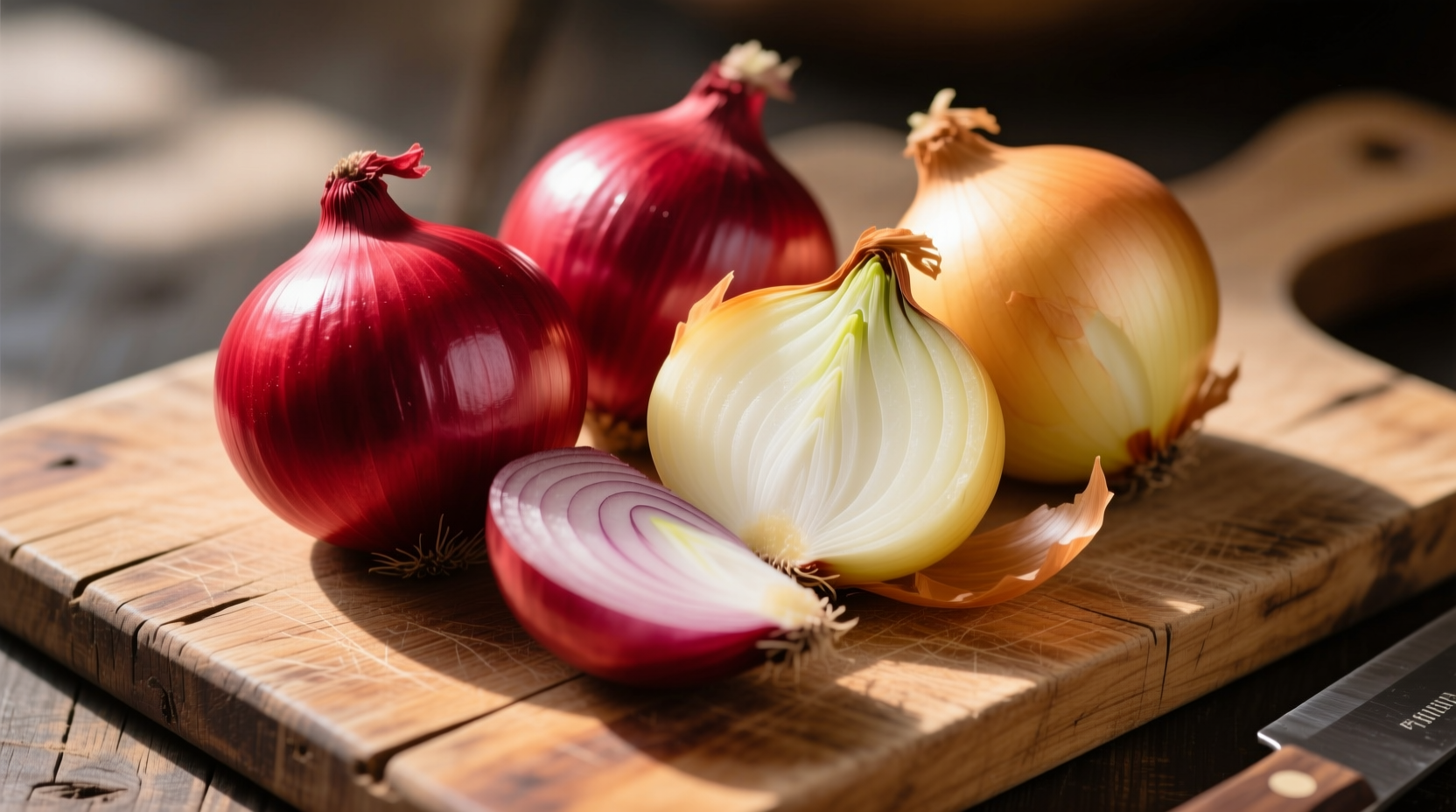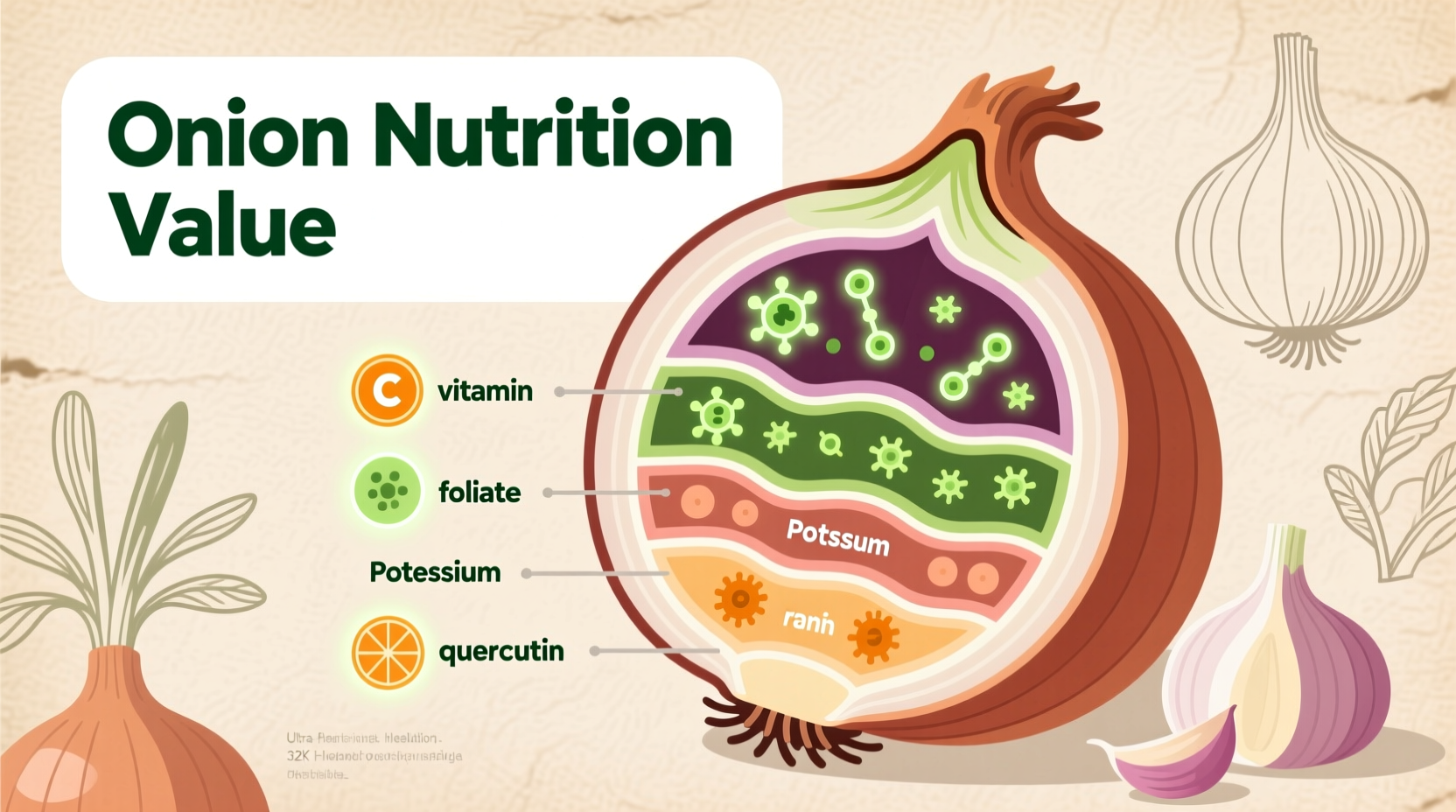When you reach for that humble onion in your kitchen, you're grabbing one of nature's most nutritionally impressive vegetables. Despite their small size and pungent aroma, onions deliver a powerhouse of essential nutrients that contribute significantly to overall health. Let's explore exactly what makes this kitchen staple so valuable beyond just flavor enhancement.
Complete Onion Nutritional Profile Per 100g
According to the USDA FoodData Central database, raw yellow onions contain the following nutritional values:
| Nutrient | Amount | % Daily Value* |
|---|---|---|
| Calories | 40 kcal | 2% |
| Total Carbohydrates | 9.3g | 3% |
| Dietary Fiber | 1.7g | 6% |
| Sugars | 4.2g | - |
| Protein | 1.1g | 2% |
| Vitamin C | 7.4mg | 8% |
| Vitamin B6 | 0.12mg | 7% |
| Folate (B9) | 19μg | 5% |
| Potassium | 146mg | 4% |
| Manganese | 0.13mg | 6% |
| Calcium | 23mg | 2% |
| Magnesium | 10mg | 2% |
*Percent Daily Values based on a 2,000 calorie diet. Source: USDA FoodData Central, Release 2024
Why Onion Nutrition Value Matters for Your Health
Onions aren't just flavor enhancers—they're functional foods with scientifically documented health benefits. The National Center for Complementary and Integrative Health notes that onions contain organosulfur compounds that may help reduce inflammation and support cardiovascular health. These compounds are released when onions are cut or crushed, which explains why freshly chopped onions deliver maximum nutritional benefits.
Research published in the Journal of Agricultural and Food Chemistry demonstrates that red onions in particular contain high levels of quercetin, a flavonoid antioxidant with potential anti-cancer properties. Quercetin levels in red onions can be up to 11 times higher than in yellow onions, making them particularly valuable for antioxidant intake.
Comparing Onion Varieties: Which Offers the Best Nutrition Value?
Not all onions are nutritionally equal. Understanding the differences can help you maximize health benefits:
| Onion Type | Key Nutritional Advantages | Best Uses |
|---|---|---|
| Red Onions | Highest quercetin content, rich in anthocyanins (antioxidants) | Raw in salads, salsas, sandwiches |
| Yellow Onions | Higher sulfur compounds, best for cooking | Sautéing, caramelizing, soups, stews |
| White Onions | Milder flavor, slightly higher vitamin C | Mexican cuisine, fresh salsas, guacamole |
| Green Onions | Rich in vitamin K (52% DV per 100g), vitamin A | Garnishes, stir-fries, salads |
How Cooking Methods Affect Onion Nutrition Value
Your preparation method significantly impacts the nutritional value you receive from onions. According to research from the University of California, Davis, certain cooking techniques preserve more nutrients than others:
- Raw consumption: Maximizes vitamin C and enzyme content but may cause digestive discomfort for some individuals
- Light sautéing (3-5 minutes): Preserves most antioxidants while making certain nutrients more bioavailable
- Boiling: Can reduce water-soluble vitamins by up to 30% (per USDA research)
- Caramelizing: Creates beneficial compounds but reduces overall volume, concentrating remaining nutrients
For maximum nutritional benefit, try slicing onions and letting them sit for 10 minutes before cooking. This allows time for the formation of beneficial organosulfur compounds, as documented by the American Chemical Society.

Onions in Historical and Modern Nutrition
Throughout history, onions have been valued not just as food but as medicine. Ancient Egyptian medical texts from 1600 BCE mention onions for treating heart disease and infections. Fast forward to today, and modern science confirms many of these traditional uses. The World Health Organization recognizes onions for their traditional use in treating coughs and colds, while contemporary research continues to validate their cardiovascular benefits.
Unlike many "superfoods" that come and go in popularity, onions have maintained their nutritional relevance across civilizations. This historical continuity speaks to their genuine nutritional value rather than being a passing dietary trend.
Practical Ways to Maximize Onion Nutrition in Your Diet
Getting the most from onion nutrition value doesn't require complicated techniques. Try these simple strategies:
- Pair with healthy fats: Consuming onions with olive oil or avocado enhances absorption of fat-soluble antioxidants
- Combine with other alliums: Mix onions with garlic and leeks for synergistic health benefits
- Use the whole onion: The outer layers contain the highest concentration of flavonoids—avoid excessive peeling
- Store properly: Keep whole onions in a cool, dry, dark place to preserve nutrients for up to 2 months
For those concerned about onion breath, chewing fresh parsley or mint leaves after consumption can neutralize odors without compromising nutritional benefits.
When Onion Nutrition Might Not Suit Everyone
While onions offer impressive nutritional benefits, they may cause issues for certain individuals. People with irritable bowel syndrome (IBS) following a low-FODMAP diet often need to limit onion consumption, as noted by Monash University's research on digestive health. Similarly, those taking blood thinners should monitor onion intake due to the vitamin K content in green onions, though regular bulb onions contain minimal amounts.
The key is understanding your personal tolerance and adjusting consumption accordingly—most people can safely enjoy onions daily as part of a balanced diet.
Frequently Asked Questions About Onion Nutrition
Here are answers to common questions about onion nutritional value:
How many calories are in a medium onion?
A medium onion (approximately 110g) contains about 44 calories. Most of these calories come from natural sugars and carbohydrates, with minimal fat content. Onions remain an excellent low-calorie option for adding flavor and nutrition to meals without significant caloric impact.
Are cooked onions as nutritious as raw onions?
Cooked and raw onions offer different nutritional profiles. Raw onions preserve more vitamin C and certain enzymes, while cooking increases the bioavailability of some antioxidants like quercetin. Light cooking methods like sautéing for 3-5 minutes generally preserve the most nutrients. Boiling causes the greatest nutrient loss, particularly of water-soluble vitamins.
Which onion variety has the highest nutritional value?
Red onions generally offer the highest nutritional value due to their elevated quercetin and anthocyanin content—antioxidants with potent anti-inflammatory properties. Research from the Journal of Agricultural and Food Chemistry shows red onions contain up to 11 times more quercetin than yellow onions. However, yellow onions provide higher levels of sulfur compounds beneficial for cardiovascular health.
Can onions help lower blood sugar levels?
Emerging research suggests onions may help regulate blood sugar. A study published in the journal Nutrition found that onion extract significantly reduced blood glucose levels in diabetic rats. The chromium content in onions may improve insulin sensitivity, while the sulfur compounds may enhance glucose metabolism. While not a replacement for diabetes medication, regular onion consumption can be part of a blood-sugar-friendly diet.
How do onions support heart health?
Onions support heart health through multiple mechanisms. The quercetin in onions acts as an antioxidant that may reduce inflammation in blood vessels. Sulfur compounds in onions may help lower blood pressure and prevent blood clots. Potassium content helps regulate fluid balance and blood pressure. Research published in the American Journal of Clinical Nutrition associates regular onion consumption with improved cholesterol profiles and reduced risk of cardiovascular disease.











 浙公网安备
33010002000092号
浙公网安备
33010002000092号 浙B2-20120091-4
浙B2-20120091-4